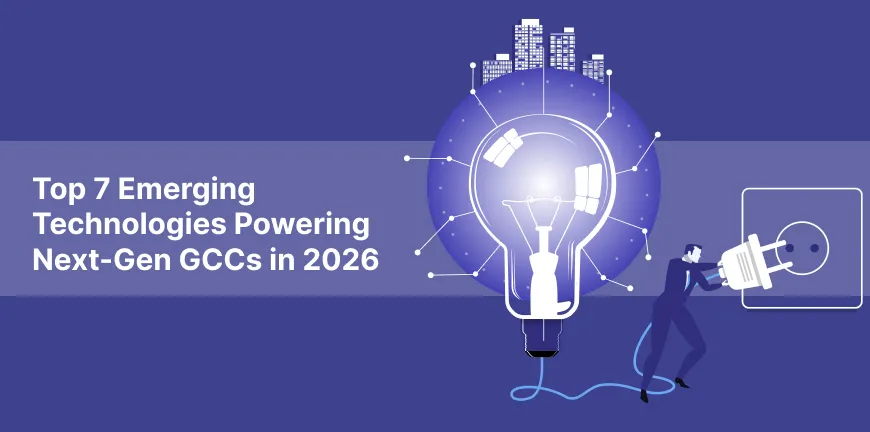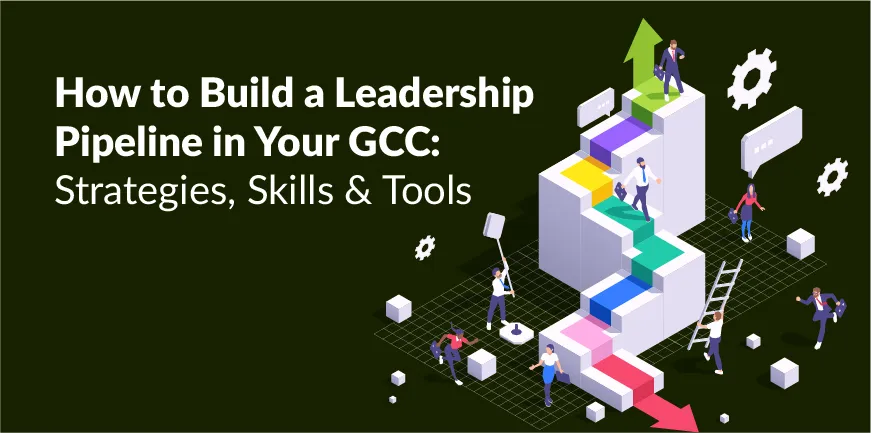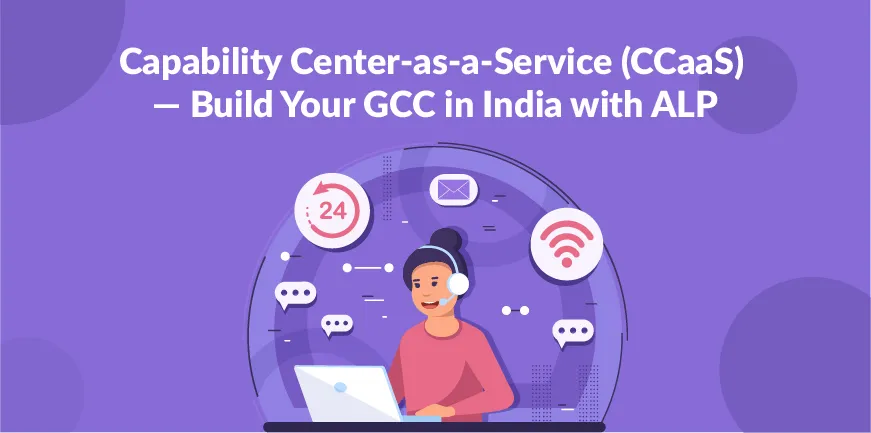
Traditional vs Modern Recruitment: Which One is Best?
14/11/2025
How Tier-2 Cities Are Shaping the Next Wave of GCC Growth in India?
14/11/2025- How Are Emerging Technologies Redefining the Role of GCCs in 2026?
- Which are the Top Emerging Technologies Powering the Next Wave of GCC Innovation?
- What Role Do AI and Automation Play in Modern GCC Operations?
- How Are Cloud and Edge Computing Transforming the Scalability of GCCs?
- Can Data Analytics and ML Drive Smarter Business Outcomes for GCCs?
- How Are Cybersecurity and Zero-Trust Models Strengthening GCC Infrastructure?
- What are the Latest Trends in Emerging Technologies in Next-Gen GCCs?
- How Alp Consulting Helps Companies Set Up for the Next-Gen GCCs?
- Key Takeaways
- FAQS
“The GCC of today is no longer an extended workbench. It is also a reinvention engine or something like an extension HQ which is very deeply aligned with the business.”- Ujjwal Jyoti, Managing Director, GCC Sales Lead, Accenture in India.
Emerging technologies are reshaping the function & strategic value of GCCs by driving innovation, efficiency, and global integration. Once seen as cost-optimization hubs, GCCs are now the digital backbone of MNCs, leading transformation initiatives. For instance, nearly 70% of GCCs in India are making huge investments in Generative AI (GenAI) use cases to drive smarter & faster business models. Let’s discuss the top 7 emerging technologies powering the next phase of GCC transformation in India.
How Are Emerging Technologies Redefining the Role of GCCs in 2026?
Here are 5 ways emerging technologies are reshaping the next-gen GCCs in India:
1. From Back-Office to Innovation Hub
Emerging technologies are transforming GCCs into innovation epicentres that drive global product design, research, & business transformation. More than 90 % of GCCs in India now function as multi-functional hubs (not just support) with technology, operations, and product engineering
2. Strategic Business Enablers via AI, Automation & Analytics
The triple A combo AI, automation, & analytics are empowering GCCs to transition from transactional roles to strategic business enablers focused on insights and value creation. According to EY, 69 % of GCCs say GenAI is a top priority for customer experience, 57 % for operations, and 47 % for IT & cybersecurity.
3. Operational Scalability through Cloud & Edge
Cloud and edge computing enhance operational scalability, ensuring seamless connectivity and data-driven agility across geographies. According to ETCIO, India currently hosts over 1,700 GCCs generating US$64.6 billion annual revenue, and the sector is projected to hit US$100 billion by 2030.
4. Resilience & Trust with Cybersecurity and Zero-Trust Frameworks
Cybersecurity and zero-trust frameworks provide resilience & trust in managing vast global data ecosystems. According to IBM Security Report 2024-25, 63% of companies around the globe have implemented or are in the process of adopting a Zero-Trust framework to strengthen cybersecurity resilience.
5. Sustainable Innovation through IoT and Digital Twins
GCCs are championing sustainable innovation using IoT & digital twins to monitor energy efficiency and optimize green operations. According to the Deloitte Tech Trends Report 2025, Digital twin technology adoption among GCCs is growing at over 30% annually, helping companies simulate operational efficiency, predict equipment performance, & achieve carbon reduction targets.
Which are the Top Emerging Technologies Powering the Next Wave of GCC Innovation?
The next phase of GCC evolution is bolstered by technologies that enable intelligence, automation, & resilience. These technologies not only supercharge efficiency but also foster innovation, tie-ups, & future readiness across sectors. From AI-powered insights to blockchain-powered transparency, next-gen GCCs are becoming digital command centers for global enterprises. Here are the top 7 emerging technologies revolutionizing the Next-gen GCCs:
1. Artificial Intelligence (AI)
AI is redefining how GCCs function, turning them into cognitive hubs that enable smart automation & intelligent decision-making. By integrating AI into their business DNA, GCCs are driving predictive analytics, enhancing customer engagement, & accelerating time-to-market.
AI-powered platforms enable GCCs to perform advanced data analysis, identify growth opportunities, & optimize supply chain operations. Industries such as banking, retail, & healthcare benefit from AI-driven fraud detection, recommendation engines, & demand forecasting.
Moreover, numerous enterprises now run AI Centers of Excellence (CoEs) within GCCs, focusing on areas such as conversational AI, image recognition, & generative AI, which, when combined, boost innovation velocity & reduce operational silos.
The AI-Enabled GCC Market size is projected to grow at a CAGR of 21.03% from 2024 to 2032, highlighting the massive EVC (Expected Value Creation) from AI-enabled services.
2. Machine Learning (ML)
Machine Learning empowers GCCs to move from descriptive analytics to predictive & prescriptive intelligence. Additionally, ML algorithms continuously learn from enterprise data, helping GCCs uncover trends, forecast demand, detect anomalies, & improve process accuracy. The Machine Learning category currently holds the largest market share (50%) in the GCC AI market, driven by applications in predictive analytics & operational optimization.
By using ML-based models, GCCs enhance everything from dynamic pricing to preventive maintenance, employee attrition prediction, & marketing optimization. In industries like logistics and telecom, ML supports intelligent routing, network optimization, & predictive capacity planning. Moreover, as GCCs continue to scale, ML ensures smarter business decisions that are grounded in real-time data and adaptive learning frameworks.
3. Cloud Computing
Cloud computing is the foundation of scalability & agility for next-gen GCCs. The shift to cloud-based architectures enables enterprises to operate across geographies, allowing for faster collaboration, real-time data sharing, & cost optimization. The GCC Cloud Infrastructure Services market is projected to grow at a CAGR of 13.66% from 2025 to 2035, reaching $4.5 billion by 2035.
Hybrid & multi-cloud environments give GCCs the flexibility to manage workloads across public & private clouds, ensuring regulatory compliance and security while optimizing performance.
Additionally, cloud-native tools empower GCCs to deploy applications faster, manage DevOps seamlessly, & innovate with minimal infrastructure constraints.
Cloud-driven GCCs are increasingly integrating FinOps (financial operations) & AI Ops (AI-driven operations) to monitor costs, manage workloads efficiently, and enhance infrastructure resilience.
4. Edge Computing
Edge computing is transforming how GCCs process & analyze data by bringing computation closer to where it’s generated. This dramatically reduces latency, enhances real-time decision-making, and improves efficiency across connected ecosystems. The GCC Edge Computing market is estimated to reach $3.14 billion by 2033, exhibiting a whopping CAGR of 26.2% from 2025–2033.
In industrial settings, edge-enabled GCCs are supporting IoT-based automation, real-time monitoring, & predictive analytics for manufacturing and logistics.
For global enterprises, it ensures that mission-critical applications like autonomous systems, connected healthcare devices, and digital twins run seamlessly, even in remote environments.
Edge computing also helps minimise bandwidth usage & ensures data sovereignty by processing sensitive information locally before syncing with the cloud.
5. Robotic Process Automation (RPA)
RPA is one of the most transformative technologies driving GCC modernization. By automating repetitive, rule-based tasks, RPA boosts efficiency, accuracy, and compliance. GCC companies are projected to save around $1 billion collectively by deploying RPA solutions, with a typical cost reduction target of 10% in business processes.
GCCs are deploying bots for invoice processing, payroll management, reporting, & HR administration, significantly reducing turnaround time and human dependency.
When combined with AI (aka Intelligent Automation), RPA enables GCCs to handle complex decision-making tasks, interpret unstructured data, & improve customer interactions.
This technology frees up human capital for strategic work such as innovation, product design, and problem-solving, redefining workforce productivity across enterprise operations.
6. Cybersecurity & Zero-Trust Frameworks
With data becoming the lifeblood of modern enterprises, cybersecurity has emerged as a cornerstone of GCC infrastructure. Also, Cybersecurity, along with AI and Cloud, is consistently cited as a top 3 investment area for GCCs heading into 2026.
Advanced security frameworks powered by AI & analytics help detect, prevent, and respond to cyber threats in real time. The Zero-Trust model, built on the principle of “never trust, always verify,” ensures that every user & device is authenticated continuously, minimizing all types of risks.
Moreover, GCCs are now integrating automated incident response systems, behavioural analytics, & AI-driven threat intelligence to fortify resilience.
By building centralized security operations centers (SOCs), GCCs also ensure compliance with international data protection laws like GDPR & ISO 27001.
7. Blockchain Technology
Blockchain is revolutionizing how GCCs manage transparency, security, & accountability. With its decentralized ledger, blockchain enables tamper-proof recordkeeping, smart contracts, and traceability across supply chains. The Global Blockchain-as-a-Service (BaaS) market is projected to grow at a massive CAGR of around 58% from 2025 to 2033.
GCCs are using blockchain to streamline cross-border payments, verify vendor authenticity, & automate contract execution without intermediaries.
In the financial & logistics sectors, blockchain-based solutions enhance auditability, reduce fraud, and strengthen regulatory compliance.
The rise of Blockchain-as-a-Service (BaaS) further allows GCCs to experiment with blockchain infrastructure at scale, making operations more transparent, secure, & efficient.
What Role Do AI and Automation Play in Modern GCC Operations?
AI and automation are at the heart of modern GCC operations, enhancing both efficiency and innovation. These technologies are helping GCCs move beyond process execution toward driving enterprise transformation. Here are 5 ways AI and Automation are reshaping the next-gen GCC ecosystem.
1. Automate Back-Office Operations
Streamline & automate back-office processes, minimizing human error and operational delays across finance, HR, IT functions, etc. Globally, it is projected that around 69% of routine managerial tasks will be fully automated by 2026, freeing up GCC workers for higher-value and strategic work.
2. Leverage Predictive Analytics
Enable predictive analytics that assist in forecasting demand, improving supply chain efficiency, and supporting real-time business decision-making. Example: In sectors like manufacturing & energy, AI-powered predictive maintenance, often managed by GCCs, can anticipate equipment failures, preventing downtime & reducing repair costs.
3. Better Customer Experience
Deliver intelligent customer experiences via AI-powered assistants & chatbots capable of understanding context and sentiment. Globally, 80% of companies are either utilising or planning to adopt AI-powered chatbots for customer service by 2025-26. These chatbots are capable of managing up to 80% of routine tasks & inquiries.
4. Enhance HR functions
Empower HR functions with automated hiring, talent analytics, & performance management powered by data insights. AI in recruitment is demonstrably positive, reducing costs of candidate sourcing by 30-35% and boosting shortlisting accuracy by 80%.
5. Fastrack Innovation
Accelerate innovation cycles through AI-driven product testing, process simulation, & digital twin applications. Example: One case study showed a firm leveraging GitHub Copilot to help engineers write code faster, boost productivity by 10% and deliver volume into production by 25%.
Together, AI & automation help GCCs shift from efficiency-focused to intelligence-driven organizations, where data & algorithms become the foundation of business excellence.
How Are Cloud and Edge Computing Transforming the Scalability of GCCs?
Cloud and edge computing are the twin enablers of flexibility & resilience for GCCs. They empower enterprises to scale their operations dynamically while ensuring real-time responsiveness. Here are 5 ways cloud and edge computing are transforming the scalability of GCCs:
1. Seamless Collaboration
Cloud ecosystems enable multi-location teams to collaborate in real time, fostering innovation & reducing project timelines.
Example: A GCC supporting a global retail brand leverages Microsoft Azure & Microsoft Teams to facilitate real-time collaboration between its design, logistics, & analytics teams across India, the U.S., & Europe.
2. Scalable Infrastructure
GCCs can scale up or down in a jiffy to match workloads, optimizing both performance & costs.
Example: A financial services GCC scales its AWS cloud servers during quarterly reporting periods to manage spikes in transaction data, then scales down afterward to keep costs within budget.
3. Real-Time Insights
Edge computing enables instant data processing, ensuring critical decisions are made in a canter & closer to the source.
Example: A manufacturing GCC utilises edge devices to monitor factory equipment in real time, predicting maintenance needs in a flash without relying on centralized data processing.
4. Cost Efficiency
Cloud adoption reduces the dependency on physical infrastructure, lowering capital expenses while boosting service delivery.
Example: A healthcare GCC migrates its patient management system to Google Cloud, reducing IT maintenance costs & ensuring secure access to data across multiple hospitals at the desired time.
4. Business Continuity
Cloud-based backups and distributed data models enhance resilience and disaster recovery capabilities.
Example: A BFSI GCC uses hybrid cloud backups via IBM Cloud to guarantee uninterrupted operations and rapid recovery during regional data center outages.
Can Data Analytics and ML Drive Smarter Business Outcomes for GCCs?
The short answer to this is absolutely yes. Data Analytics and Machine Learning (ML) are remodelling GCCs into intelligent decision-making engines. By analysing structured & unstructured data, GCCs can uncover patterns, predict outcomes, & drive business innovation. Predictive models guide decision-makers in identifying cost optimization opportunities, while prescriptive analytics suggest the best course of action.
ML algorithms continuously elevate with exposure to new data, enabling real-time risk mitigation, trend identification, & performance enhancement. GCCs use analytics to enhance customer engagement, operational forecasting, fraud detection, & workforce optimization. Together, data analytics and ML empower GCCs to run on their toes, insight-driven partners in achieving global business growth & competitive differentiation.
How Are Cybersecurity and Zero-Trust Models Strengthening GCC Infrastructure?
As GCCs handle vast amounts of enterprise & customer data, cybersecurity becomes mission-critical. The adoption of zero-trust models ensures that every access point, user, & transaction is verified, always minimizing potential vulnerabilities. Here are 5 ways Cybersecurity and Zero-Trust Models are strengthening GCC Infrastructure.
- Establishing identity-based access to ensure that every request is authenticated before granting entry to systems.
- Leveraging AI-driven threat monitoring for proactive detection & rapid incident response.
- Implementing encryption, multi-factor authentication, & endpoint protection to secure critical assets.
- Maintaining compliance with global security frameworks via continuous audits and automated governance tools.
- Building predictive defence mechanisms powered by analytics to detect and neutralize threats before they escalate.
Cybersecurity-first strategies enable GCCs to operate securely in hybrid, cloud, & multi-location environments while maintaining trust and compliance.
What are the Latest Trends in Emerging Technologies in Next-Gen GCCs?
Next-generation GCCs are leveraging technology not just for efficiency but for competitive differentiation. The following trends define their transformation trajectory in 2026 and beyond:
1. Generative AI Integration
Used to automate code creation, design prototypes, & enhance creative problem-solving across domains.
2. Hybrid Cloud Ecosystems
Offering flexibility, security, & cost optimization by integrating public & private cloud infrastructures.
3. Digital Twins Adoption
Enabling real-time simulation of business processes & predictive maintenance in manufacturing & logistics.
4. Sustainability Tech
Focusing on green data centers, renewable energy, & carbon-neutral operations within GCC frameworks.
5. Cybersecurity Mesh Architecture
Providing decentralized yet secure digital environments to strengthen enterprise-wide data protection.
How Alp Consulting Helps Companies Set Up for the Next-Gen GCCs?
Alp Consulting partners with enterprises to establish future-ready GCCs built on innovation, agility, & digital excellence. From location strategy & compliance management to digital workforce hiring and operational setup, ALP provides end-to-end GCC establishment services. The firm’s deep expertise in emerging technologies helps businesses design intelligent, scalable, & resilient GCC frameworks.
By aligning with global standards, Alp ensures companies leverage AI, cloud, and automation to achieve faster scalability and operational maturity. With a strong focus on governance, cost optimization, and tech enablement, Alp transforms GCCs into strategic global growth drivers.
Key Takeaways
- Emerging technologies like AI, cloud, and automation are redefining GCCs as global innovation hubs.
- Cloud and edge computing empower GCCs with scalability, real-time collaboration, & operational agility worldwide.
- AI and ML-driven analytics enable predictive insights, improving efficiency, customer experience, & business transformation.
- Zero-trust cybersecurity and blockchain frameworks strengthen data integrity, transparency, & regulatory compliance.
- Sustainability tech and digital twins promote energy efficiency, driving eco-friendly and future-ready GCC operations.
FAQS
1. How are GCCs balancing human expertise with technological automation?
By integrating automation with human intelligence, GCCs ensure that technology enhances, not replaces, human decision-making and creativity.
2. What challenges do GCCs face when integrating emerging technologies?
Legacy systems, skill gaps, data silos, and change management challenges often delay seamless tech adoption in GCCs.
3. How are GCCs building digital talent pipelines to support emerging technologies?
GCCs build talent pipeline via upskilling programs, academic partnerships, & recruitment focused on digital-first capabilities.
4. What KPIs are used to measure the success of tech-driven GCC transformation?
Efficiency gains, cost reduction, innovation speed, employee productivity, and customer satisfaction are key metrics used to measure GCC success.
5. How are sustainability and green technologies influencing next-gen GCC strategies?
Sustainability and green technologies are shaping eco-efficient operations in GCCs through energy optimization, green data centers, & sustainable process automation.

Kishore V N
Kishore V N is the Managing Director at ALP Consulting, bringing over 29 years of extensive experience in global recruitment, talent strategy, and workforce solutions. He has been instrumental in building scalable RPO, MSP, and modular talent sourcing models that empower organizations with a competitive edge in talent acquisition. Kishore’s leadership focuses on expanding ALP’s global presence, driving innovation in recruitment technology, and enhancing operational excellence. He also serves as Director at Datacore Technologies, steering digital HR transformation through advanced HRMS and virtual staffing solutions.




